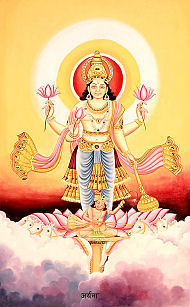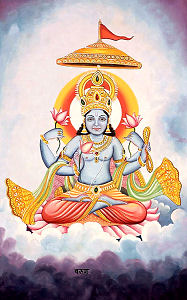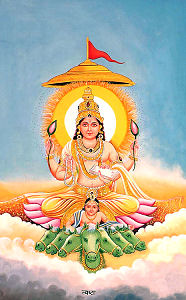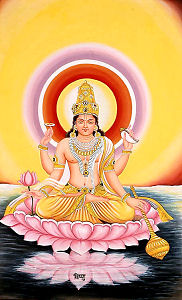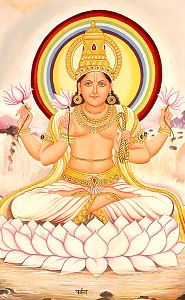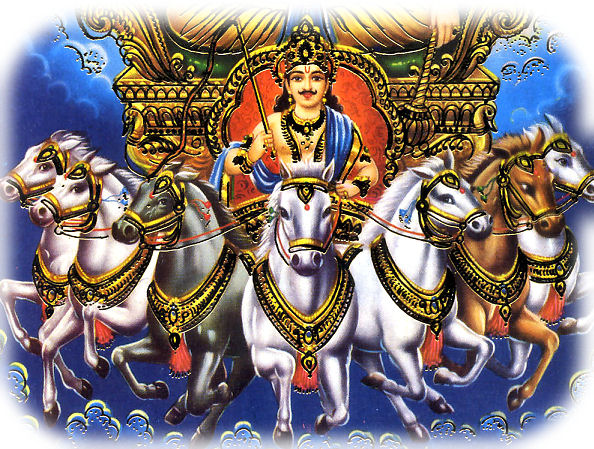The twelve Sun-Gods (12 Adityas) And Their Associates
(Srimad Bhagavatam 12.11.27-49) A.C. Bhaktivedanta Swami prabhupada
|
47-48. While the sages glorify the sun-god with the hymns of the Sama-, Rig- and Yajur Vedas, which reveal his identity, the Gandharvas also sing his praises and the Apsaras dance before his chariot. The Nagas arrange the chariot ropes and the Yaksas harness the horses to the chariot, while the powerful Raksasas push from behind. 49. Facing the chariot, the sixty thousand brahmana sages known as Valakhilyas travel in front and offer prayers to the almighty sun-god with Vedic mantras. 46. Thus, throughout the twelve months, the lord of the sun travels in all directions with his six types of associates, disseminating among the inhabitants of this universe purity of consciousness for both this life and the next. 45. All these personalities are the opulent expansions of the Supreme Personality of Godhead, Visnu, in the form of the sun-god. These deities take away all the sinful reactions of those who remember them each day at dawn and sunset. |
 |
The twelve Adityas are nothing but different forms of the Sun-God Surya. In
different Puranas their names are given differently. Brahma once
recounted to the sages the one hundred and eight sacred
names of Surya. The Brahma Purana lists these names and we reproduce
them in nine groups of twelve names each.
(1) Surya, Archana, Bhagavana, Tvashta, Pusha, Arka, Savita, Ravi, Gabhastimana,
Aja, Kala, Mrityu.
(2) Dhata, Prabhakara, Prithivi, Jala, Teja, Akasha, Vayu, Parayana, Soma, Brihaspati,
Shukra, Budha.
(3) Angaraka, Indra, Vivasvana, Diptamshu, Shuchi, Shouri,Shanaishvara, Brahma,
Vishu, Rudra, Skanda, Vaishravana.
(4) Yama, Vaidyuta, Jathara, Agni, Aindhana, Tejohapti, Dharmadhvaja, Vedakarta,
Vedanga, Vedavahana, Krita, Treta.
(5) Dvapara, Kali, Sarvasurashraya, Kala, Kashtha, Muhurta, Kshapa, Yama, Kshana,
Samvatsara, Ashvattha, Kalachakra.
(6) Vibhavasu, Shashvata, Purusha, Yogi, Vyaktavyakta, Sanatana, Kaladhyaksha,
Prajadhyaksha, Vishvakarma, Tamonuda, Varuna, Sagara.
(7) Amsha, Jimuta, Jivana, Ariha, Bhutashraya, Bhutapati, Sarvalokanamaskrita,
Shrashta, Samvartaka, Vahni, Sarvadi, Alolupa.
(8) Anata, Kapila, Bhanu, Kamada, Sarvotamukha, Jaya, Vishala, Varada, Sarvabhutasevita,
Mana, Suparna, Bhutadi.
(9) Shighraga, Pranadharana, Dhanvantari, Dhumaketu, Adideva, Aditinandana,
Dvadashatma, Ravi, Daksha, Pita, Mata, Pitamaha.
"All these personalities are the opulent expansions of the Supreme Personality of Godhead, Visnu, in the form of the sun-god. These deities take away all the sinful reactions of those who remember them each day at dawn and sunset." (Srimad Bhagavatam 12.11.45)
The twelve Sun-gods (12 Adityas)
The 12 Adityas and their Associates
(Srimad Bhagavatam 12.11.27-49)
|
Ruling
Month
|
|
|||||||||||||||
|
March - April |
Chaitra
|
1
|
Dhata
|
Pulastya
|
Rathakrt
|
Tumburu
|
Krtasthali
|
Heti
|
Vasuki
|
|||||||
|
April - May |
Vaishakha
|
2
|
Aryama
|
Pulaha
|
Athauja
|
Narada
|
Punjikasthali
|
Praheti
|
Kacchanira
|
|||||||
|
May - June |
Jyeshtha
|
3
|
Mitra
|
Atri
|
Rathasvana
|
Haha
|
Menaka
|
Pauruseya
|
Taksaka
|
|||||||
|
June - July |
Ashadha
|
4
|
Varuna
|
Vasistha
|
Citrasvana
|
Huhu
|
Rambha
|
Sahajanya
|
Sukra
|
|||||||
|
July - August |
Shravana
|
5
|
Indra
|
Angira
|
Srota
|
Visvavasu
|
Pramloca
|
Varya
|
Elapatra
|
|||||||
|
Aug - Sept |
Bhadrapada
|
6
|
Vivasvan
|
Bhrgu
|
Asarana
|
Ugrasena
|
Anumloca
|
Vyaghra
|
Sankhapala
|
|||||||
|
Sept - Oct |
Ashvina
|
7
|
Tvashtha
|
Jamadagni
|
Satajit
|
Dhrtarastra
|
Tilottama
|
Brahmapeta
|
Kambalasva
|
|||||||
|
Oct - Nov |
Kartika
|
8
|
Vishnu
|
Visvamitra
|
Satyajit
|
Suryavarca
|
Rambha
|
Makhapeta
|
Asvatara
|
|||||||
|
Nov - Dec |
Margashirsha
|
9
|
Amshuman
|
Kasyapa
|
Tarksya
|
Rtasena
|
Urvasi
|
Vidyucchatru
|
Mahasankha
|
|||||||
|
Dec - Jan |
Pausha
|
10
|
Bhaga
|
Ayur
|
Uma
|
Aristanemi
|
Purvacitti
|
Sphurja
|
Karkotaka
|
|||||||
|
Jan - Feb |
Magha
|
11
|
Pushya
|
Gautama
|
Suruci
|
Susena
|
Ghrtaci
|
Vata
|
Dhananjaya
|
|||||||
|
Feb - March |
Phalguna |
12
|
Parjanya
|
Bharadvaja
|
Ritu
|
Visva
|
Senajit
|
Varca
|
Airavata
|
|||||||
In each month of the year, it is a different aditya who shines. As Indra, Surya destroys the enemies of the gods. As Dhata, he creates living beings. As Parjanya, he showers down rain. As Tvashta, he lives in the trees and herbs. As Pusha, he makes foodgrains grow. As Aryama, he is in the wind. As Bhaga, he is in the body of all 0living beings. As Vivasvana, he is in fire and helps to cook food. As Vishnu, he destroys the enemies of the gods. As Amshumana, he is again in the wind. As Varuna, Surya is in the waters and as Mitra, he is in the moon and in the oceans.
The different Forms of the Sun-god
Srimad Bhagavatam Canto 12, Chapter 11, Text 27-49
27-28. Sri Saunaka said: Please describe to us, who have great faith in your words, the different sets of seven personal features and associates the sun-god exhibits during each month, along with their names and activities. The associates of the sun-god, who serve their lord, are personal expansions of the Supreme Personality of Godhead Hari in His feature as the presiding deity of the sun.
29. Suta Gosvami said: The sun travels among all the planets and thus regulates their movements. It has been created by Lord Visnu, the Supreme Soul of all embodied beings, through His beginningless material energy.
30. The sun-god, being nondifferent from Lord Hari, is the one soul of all the worlds and their original creator. He is the source of all the ritualistic activities prescribed in the Vedas and has been given many names by the Vedic sages.
31. Being the source of the material energy, the Personality of Godhead Lord Hari in His expansion as the sun-god is described in nine aspects, O Saunaka: the time, the place, the endeavor, the performer, the instrument, the specific ritual, the scripture, the paraphernalia of worship and the result to be achieved.
32. The Supreme Personality of Godhead, manifesting His potency of time as the sun-god, travels about in each of the twelve months, beginning with Madhu, to regulate planetary motion within the universe. Traveling with the sun-god in each of the twelve months is a different set of six associates.
33. My dear sage, Dhata as the sun-god, Krtasthali as the Apsara, Heti as the Raksasa, Vasuki as the Naga, Rathakrt as the Yaksa, Pulastya as the sage and Tumburu as the Gandharva rule the month of Madhu.
34. Aryama as the sun-god, Pulaha as the sage, Athauja as the Yaksa, Praheti as the Raksasa, Punjikasthali as the Apsara, Narada as the Gandharva and Kacchanira as the Naga rule the month of Madhava.
35. Mitra as the sun-god, Atri as the sage, Pauruseya as the Raksasa, Taksaka as the Naga, Menaka as the Apsara, Haha as the Gandharva and Rathasvana as the Yaksa rule the month of Sukra.
36. Vasistha as the sage, Varuna as the sun-god, Rambha as the Apsara, Sahajanya as the Raksasa, Huhu as the Gandharva, Sukra as the Naga and Citrasvana as the Yaksa rule the month of Suci.
37. Indra as the sun-god, Visvavasu as the Gandharva, Srota as the Yaksa, Elapatra as the Naga, Angira as the sage, Pramloca as the Apsara and Varya as the Raksasa rule the month of Nabhas.
38. Vivasvan as the sun-god, Ugrasena as the Gandharva, Vyaghra as the Raksasa, Asarana as the Yaksa, Bhrgu as the sage, Anumloca as the Apsara and Sankhapala as the Naga rule the month of Nabhasya.
39. Pusha as the sun-god, Dhananjaya as the Naga, Vata as the Raksasa, Susena as the Gandharva, Suruci as the Yaksa, Ghrtaci as the Apsara and Gautama as the sage rule the month of Tapas.
40. Ritu as the Yaksa, Varca as the Raksasa, Bharadvaja as the sage, Parjanya as the sun-god, Senajit as the Apsara, Visva as the Gandharva and Airavata as the Naga rule the month known as Tapasya.
41. Amshu as the sun-god, Kasyapa as the sage, Tarksya as the Yaksa, Rtasena as the Gandharva, Urvasi as the Apsara, Vidyucchatru as the Raksasa and Mahasa“kha as the Naga rule the month of Sahas.
42. Bhaga as the sun-god, Sphurja as the Raksasa, Aristanemi as the Gandharva, Uma as the Yaksa, Ayur as the sage, Karkotaka as the Naga and Purvacitti as the Apsara rule the month of Pusya.
43. Tvashtha as the sun-god; Jamadagni, the son of Rcika, as the sage; Kambalasva as the Naga; Tilottama as the Apsara; Brahmapeta as the Raksasa; Satajit as the Yaksa; and Dhrtarastra as the Gandharva maintain the month of Isa.
44. Vishnu as the sun-god, Asvatara as the Naga, Rambha as the Apsara, Suryavarca as the Gandharva, Satyajit as the Yaksa, Visvamitra as the sage and Makhapeta as the Raksasa rule the month of Urja.
45. All these personalities are the opulent expansions of the Supreme Personality of Godhead, Visnu, in the form of the sun-god. These deities take away all the sinful reactions of those who remember them each day at dawn and sunset.
46. Thus, throughout the twelve months, the lord of the sun travels in all directions with his six types of associates, disseminating among the inhabitants of this universe purity of consciousness for both this life and the next.
47-48. While the sages glorify the sun-god with the hymns of the Sama, Rg and Yajur Vedas, which reveal his identity, the Gandharvas also sing his praises and the Apsaras dance before his chariot. The Nagas arrange the chariot ropes and the Yaksas harness the horses to the chariot, while the powerful Raksasas push from behind.
49. Facing the chariot, the sixty thousand brahmana sages known as Valakhilyas travel in front and offer prayers to the almighty sun-god with Vedic mantras.
|
The
six Season
|
Julian
Calendar
|
Lunar
Month
|
Solar
Months
|
|
|
Spring
|
Vasanta
|
March
- April
|
Chaitra
|
Madhu
|
|
April
- May
|
Vaishakha
|
Madhava
|
||
|
Summer
|
Grishma
|
May
- June
|
Jyaishtha
|
Shukra
|
|
June
- July
|
Ashadha
|
Suchi
|
||
|
Rainy
|
Varsha
|
July-
August
|
Shravana
|
Nabhas
|
|
August
- September
|
Bhadrapada
|
Nabhasya
|
||
|
Autumn
|
Sharat
|
September
- October
|
Ashvina
|
Isha
|
|
October
- November
|
Karttika
|
Urja
|
||
|
Winter
/ Cold
|
Hemanta
|
November
- December
|
Margasirsha
(Agrahayana)
|
Sahas
|
|
December
- January
|
Pausha
|
Sahasya
|
||
|
Dewy
/ Dews
|
Shishira
|
January
- February
|
Magha
|
Tapas
|
|
February
- March
|
Phalguna
|
T
apasya
|
||
The hundred and eight names (112) of Surya
From the Mahabharata Vana parva, Sec. III (10)
The Sun, which is the representation
of the Supreme Lord Sri Krishna, is known by 108 names
These are the hundred and eight names of Surya of immeasurable energy, as told by the self-create (Brahma). These names where disclosed of old by Lord Brahma, the self created, to the illustrious Sakra, and from Sakra to Narada, and from Narada to Dhaumya, and from Dhaumya to the sons of Pritha, the Pandavas.
For the acquisition of prosperity, I bow down to thee, O Bhaskara, blazing like unto gold or fire, who is worshipped of the gods and the Pitris and the Yakshas, and who is adored by Asuras, Nisacharas, and Siddhas.
Dhaumya said to Yudhistira:
Surya, Aryaman, Bhaga, Twastri, Pusha, Arka, Savitri, Ravi, Gabhastimat, Aja, Kala, Mrityu, Dhatri, Prabhakara, Prithibi, Apa, Teja, Kha, Vayu, Soma, Vrihaspati, Sukra, Budha, Angaraka, Indra, Vivaswat, Diptanshu, Suchi, Sauri, Sanaichara, Brahma, Vishnu, Rudra, Skanda, Vaisravana, Yama, Vaidyutagni, Jatharagni, Aindhna, Tejasampati, Dharmadhwaja, Veda-karttri, Vedanga, Vedavahana, Krita, Treta, Dwapara, Kali, Kala, Kastha, Muhurtta, Kshapa, Yama, and Kshana; Samvatsara-kara, Aswattha, Kalachakra, Bibhavasu, Purusha, Saswata, Yogin, Vyaktavyakta, Sanatana, Kaladhyaksha, Prajadhyaksha, Viswakarma, Tamounda, Varuna, Sagara, Ansu, Jimuta, Jivana, Arihan, Bhutasraya, Bhutapati, Srastri, Samvartaka, Vanhi, Sarvadi, Alolupa, Ananta, Kapila, Bhanu, Kamada, Sarvatomukha, Jaya, Visala, Varada, Manas, Suparna, Bhutadi, Sighraga, Prandharana, Dhanwantari, Dhumaketu, Adideva, Aditisuta, Dwadasatman, Aravindaksha, Pitri, Matri, Pitamaha, Swarga-dwara, Prajadwara, Mokshadwara, Tripistapa, Dehakarti, Prasantatman, Viswatman, Viswatomukha, Characharatman, Sukhsmatman, Maitreya.
'Whoever with fixed attention recited this hymn at sunrise, obtaineth wife and offspring and riches and the memory of his former existence, and by reciting this hymn a person attaineth patience and memory. Let a man concentrating his mind, recite this hymn. By doing so, he shall be proofed against grief and forest-fire and ocean and every object of desire shall be his.'
'And a person, male or female, that recited this hymn every day in the two twilights (sunrise and sunset) hin mind concentrated with ascetic abstraction, obtained every boon he desired, however difficult it may be, that he ask for. If he is overtaken by danger, he is delivered from it; and if bound, he is freed from the bounds.'
The hundred and eight names (112) of Surya - Alphabetically
| Adideva | Diptanshu | Prabhakara | Surya | |||
| Aditisuta | Dwadasatman | Prajadhyaksha | Swarga-dwara | |||
| Aindhna | Dwapara | Prajadwara | Tamounda | |||
| Aja | Gabhastimat | Prandharana | Teja | |||
| Alolupa | Indra | Prasantatman | Tejasampati | |||
| Ananta | Jatharagni | Prithibi | Treta | |||
| Angaraka | Jaya | Purusha | Tripistapa | |||
| Ansu | Jimuta | Pusha | Twastri | |||
| Apa | Jivana | Ravi | Vaidyutagni | |||
| Aravindaksha | Kala | Rudra | Vaisravana | |||
| Arihan | Kala | Sagara | Vanhi | |||
| Arka | Kalachakra | Samvartaka | Varada | |||
| Aryaman | Kaladhyaksha | Samvatsara-kara | Varuna | |||
| Aswattha | Kali | Sanaichara | Vayu | |||
| Bhaga | Kamada | Sanatana | Veda-karttri | |||
| Bhanu | Kapila | Sarvadi | Vedanga | |||
| Bhutadi | Kastha | Sarvatomukha | Vedavahana | |||
| Bhutapati | Kha | Saswata | Visala | |||
| Bhutasraya | Krita | Sauri | Vishnu | |||
| Bibhavasu | Kshapa | Savitri | Viswakarma | |||
| Brahma | Maitreya. | Sighraga | Viswatman | |||
| Budha | Manas | Skanda | Viswatomukha | |||
| Characharatman | Matri | Soma | Vivaswat | |||
| Dehakarti | Mokshadwara | Srastri | Vrihaspati | |||
| Dhanwantari | Mrityu | Suchi | Vyaktavyakta | |||
| Dharmadhwaja | Muhurtta | Sukhsmatman | Yama | |||
| Dhatri | Pitamaha | Sukra | Kshana | |||
| Dhumaketu | Pitri | Suparna | Yogin |
The seven (7) Horses of the Sun's Chariot
1. Gayatri, 2. Samvrihati, 3. Ushnik, 4. Jagati
5. Trishtubh, 6. Anushtubh, 7. Pankti
The chariot of Lord Surya is pulled by seven horses. Hence, he is sometimes referred to as Saptashva (Lord of Seven Horses).










